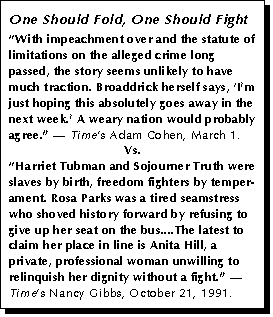 |
|||||||||
|
 |
||
|
 |
||||||||||||||||||||||||
|
||||||||||||||||||||||||
 |
||||||
|
||||||
 |
||||||
|
 |
||||||||||||||||||
|
||||||||||||||||||
 |
||||||||||||||||||||||||
|
||||||||||||||||||||||||
 |
||||||||||||||||||
|
||||||||||||||||||
|
|
|
For Immediate Release: Keith Appell (703) 683-5004 -- Friday, March 5, 1999

Media Establishment Complains Standards Have Changed, But All That's Changed Are the Targets When Is A Rape Charge Irrelevant? In the only National Public Radio story to date on Juanita Broaddrick, reporter Brooke Gladstone began: "The story attracted some notice in political and media circles back in 1992 as Clinton was approaching the finish line in his first presidential run. It wasn't reported because most of those in the know were not convinced it met the standard for evidence or relevance. Since then, however, politics and the media have changed, and so have the standards that govern them."
On February 24, PBS NewsHour media reporter Terence Smith decried the supposedly new media standard: "The Internet has come along, the all-news cable channels, there is a kind of ubiquity of news. It's everywhere. It is, as the saying goes, out there. And mainstream news organizations such as NBC no longer have any confidentiality, even within their own shop. They don't have the time now to go and do their reporting and check it and corroborate it and then make a decision whether or not to run it. They're being heckled, in effect, by others in the media." Lehrer agreed: "It's life in the rough lane of journalism right now." Lehrer boasted: "We made the very clean editorial decision not to do this story, but we are talking about it tonight in a media context, because it is media news." So how did Lehrer proceed with Anita Hill's harassment charges in 1991, before standards allegedly eroded? The day after the Totenberg story broke, The MacNeil-Lehrer NewsHour didn't verify anything: they aired extended excerpts of Hill's first press conference, then hosted two segments of interviews taking up more than half the show. New York Times reporters Felicity Barringer and David Firestone explained their paper was passed the Broaddrick rape allegations "in the waning days of the 1992 presidential campaign. Regarding it as the kind of toxic waste traditionally dumped just before Election Day, both newspapers passed on the story." But now "sober" news outlets are superseded by the new media. But it was the "toxic waste" haters at the Times that touted without verification Kitty Kelley's book of unproven gossip about Nancy Reagan on April 7, 1991. Maureen Dowd's front-page splash relayed "that both the Reagans had extramarital affairs, and that Mrs. Reagan had a long-term affair with Frank Sinatra. Ms. Kelley also writes that the Reagans once smoked marijuana provided by Alfred S. Blooming-dale, the department store heir and founder of Diners' Club, at a dinner party in the late 1960's, when Mr. Reagan was Governor of California." For all the major media complaints about the new media, the standards of journalism have not changed. All that's changed are the targets. -- Tim Graham
Home | News Division
| Bozell Columns | CyberAlerts |







 Gladstone didn't consider whether her network's allegedly high standard for
"evidence or relevance" applied when NPR's Nina Totenberg carried Anita Hill's
never-proven charges of crude male office talk in 1991. Then, it wasn't a sad day for
journalism. Totenberg put herself in a pantheon of media heroes: "The history books
are full of important and historic events that were the result of news leaks...[Watergate]
would have just been a third-rate robbery if there hadn't been a lot of leaks disclosing
what it had all been about." Other examples of the double standard:
Gladstone didn't consider whether her network's allegedly high standard for
"evidence or relevance" applied when NPR's Nina Totenberg carried Anita Hill's
never-proven charges of crude male office talk in 1991. Then, it wasn't a sad day for
journalism. Totenberg put herself in a pantheon of media heroes: "The history books
are full of important and historic events that were the result of news leaks...[Watergate]
would have just been a third-rate robbery if there hadn't been a lot of leaks disclosing
what it had all been about." Other examples of the double standard: 